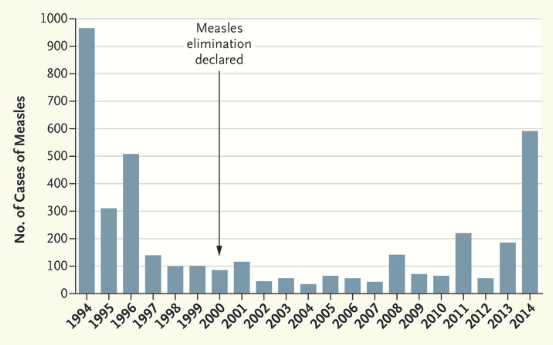Doctors and public health authorities need to renew their attention to measles, researchers from Emory Vaccine Center urge in an editorial in the New England Journal of Medicine.
"Because of its high level of contagiousness, measles is the indicator disease for weaknesses of an immunization program," write Walter Orenstein, MD, and Katherine Seib, MSPH. Orenstein is associate director of the Emory Vaccine Center and professor of medicine at Emory University School of Medicine, and Seib is research manager in Emory’s Division of Infectious Diseases.
Measles is one of the most contagious of vaccine-preventable diseases, with the average person with measles capable of infecting 12-18 people if susceptible. The contagiousness of measles infection highlights gaps in vaccination in the United States that have appeared over the last decade, because of skepticism about childhood vaccination. At the same time, international travel permits measles virus to come to the United States from countries where it is circulating to a greater degree. Although indigenous circulation of measles virus was declared eliminated from the country in 2000, the United States has seen more measles cases this year than in the last two decades, Orenstein and Seib write.
Measles outbreaks can be costly and can harm not only children whose parents have declined vaccination but other children who are too young or unable to be vaccinated. Doctors and public health authorities should ensure that the measles vaccine, known to be effective, is accessible to all who need it, especially international travelers, the authors say. In addition, Orenstein and Seib call for research on the best ways to address public concerns about vaccine safety. The very success of measles vaccination has given parents a false sense of security, they say.
"Despite the overwhelming evidence that vaccines – including the measles. Mumps and rubella vaccine – are safe, too many people still believe that greater risk is posed by vaccinating than by not vaccinating," the authors write.

